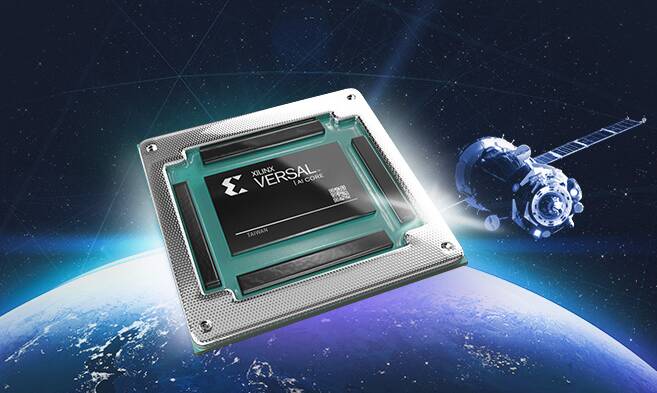Chips In Space: Reprogrammable AMD AI SoC Gets Clear For Liftoff

AMD claims that AI inferencing is about to become cheaper and more widely available for satellites and other space equipment now that a version of its reprogrammable Versal system-on-chip has been deemed worthy of celestial travel.
The Silicon Valley chip designer announced Tuesday that its XQR Versal AI Core, XQRVC190, has become its first spaceworthy Versal SoC because it has completed a Class B qualification. Class B is based on a specification from the US Department of Defense that determines the readiness of chips in outer space across multiple areas including performance, reliability, and quality.
The qualification means the radiation-tolerant Versal space SoC is set to begin shipping in early 2023. Defense contract giant Raytheon already plans to use it for "next-generation space processors" that will go into satellites and other kinds of spacecraft, according to AMD.
The space chip is part of the Versal adaptive SoC product line that AMD gained with its $49 billion purchase of FPGA maker Xilinx earlier this year. It's also part of AMD's strategy to pose a greater challenge to Nvidia and Intel in the AI compute space.
AMD seems to think the Versal space SoC will be a boon for enabling more onboard data processing and AI inferencing in space. The Ryzen designer said it represents a "major leap forward" because such capabilities were only previously possible with custom-designed ASICs, "which are prohibitively expensive for most space programs."
- How AMD, Intel, Nvidia are keeping their cores from starving
- AMD grows Epyc datacenter share, loses to Intel generally
- AMD's 96-core Epyc CPUs leapfrog Intel to put DDR5, PCIe 5.0 in the datacenter
- Intel takes on AMD and Nvidia with mad 'Max' chips for HPC
What makes the Versal space SoC special, according to AMD, is that it can be reprogrammed during development and while it's flying through the harsh radiation of space, whether the chip is in low-Earth orbit, geosynchronous Earth orbit, or beyond. AMD added that it has tested the chip alongside independent organizations to ensure it can withstand radiation levels in space.
AMD said the chip's reprogrammable nature is important because the capability will allow satellite operators to switch up processing algorithms on the fly to keep remote sensing and communications applications in top shape. ASICs, on the other hand, have fixed logic that cannot be changed after being manufactured.
"Its heterogeneous computing capabilities and reconfigurable logic fabric will enable our teams to integrate more on-board processing in a considerably smaller footprint, enabling unprecedented advances in system-level size, weight and power," said Barry Liu, senior director of space systems at Raytheon Intelligence and Space.
The Versal space SoC includes dual-core Arm Cortex-A72 and dual-core Arm Cortex-R5 embedded processors, as well as 400 AI compute engines, nearly 900,000 logic cells, and 191 million bits of memory. All the components are connected with a network-on-chip, and they are manufactured on a 7nm CMOS process. ®
Gyrostat Capital Management: Why Risk Management Is Not About Predicting Risk
Why Risk Management is Not About Predicting Risk Financial markets reward confidence, but they punish certai... Read more
Gyrostat January Outlook: Calm At Multiyear Extremes
This monthly Gyrostat Risk-Managed Market Outlook does not attempt to forecast market direction. Its p... Read more
Gyrostat December Outlook: The Market Does The Work
Harnessing Natural Volatility for Consistent Returns Markets have always moved more th... Read more
Gyrostat Capital Management: Why Advisers Must Scenario-Plan Both The Bubble And The Bust
The Blind Spot: Why Advisers Must Scenario-Plan Both The Bubble and The Bust In financial m... Read more
Gyrostat Capital Management: The Hidden Architecture Of Consequences
When Structures Themselves Become A Risk In portfolio construction, risk is rarely where we look for it.... Read more
Gyrostat November Outlook: The Rising Cost Of Doing Nothing
Through the second half of 2025, markets have delivered a curious mix of surface tranquillity and instabi... Read more

